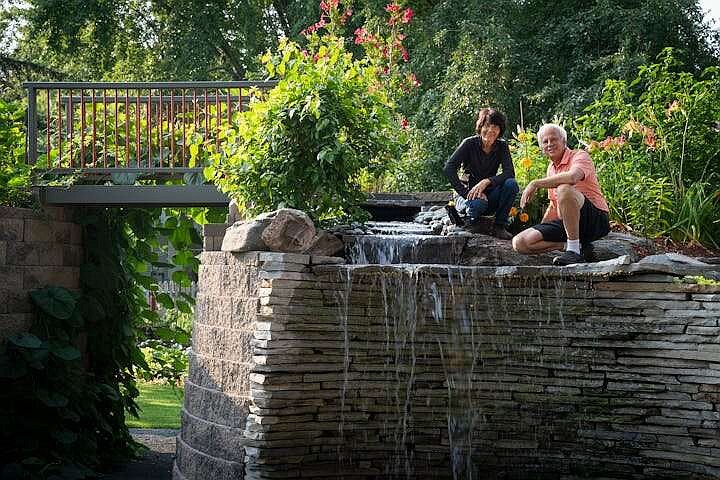If they can dream it, they can build it.
That might as well be the mantra behind Yee Lee and Bryan Johnsen's extensive gardens in Champlin, Minn., that unexpectedly grew into a budding business.
Over the course of just a few years, the couple have created a delightful display of 27 distinct gardens. Landscaping is no afterthought, either, if their most ambitious project yet -- a towering stone water feature with spiral staircases, a bridge, 6-foot-high waterfall and a stream -- is any indication.
With more than 20,000 plants and a variety of landscapes under their belt, the two recently started to host garden tours during the growing season. They say it's a way to pass on what they've learned about which plants flourish in Minnesota, including the rare hybrid and tropical plants that they especially love.
"We want our gardens to be an example of how you can improve your property over a small period of time," Johnsen says, of their gardens, named a winner in the reader-nominated 2023-24 Star Tribune Beautiful Gardens contest.
Lee, who is a language interpreter by day, loves to garden in her free time. Growing up in Laos, she learned tricks of the trade from her Hmong community, for whom gardening was an important part of everyday life. As a precision machinist who runs his own company, Johnsen loves everything construction.
The two, who married in 2017, became two peas in a pod working together in the yard.
"She's the mother of the plants and nurtures all of them, and I'm the builder," Johnsen says.
Their first major project was the front yard. When driving by their residence along heavily traveled Winnetka Avenue N. in Champlin, it's difficult to imagine that the front yard was once little more than a drainage ditch.
"It's about an acre and [the terrain] was very rough. You'd have to walk carefully without spraining your ankle, it was in such disrepair," Johnsen says. "I started regrading all of it to have better contours and evened out the soil and so forth."
SHADE-TOLERANT HOSTAS
The former ditch- turned-boulevard garden, under a canopy of trees, is now home to shade-tolerant hostas ranging from Blue Angels to Curly Fries. They mingle with puffy red and fuchsia dahlias and purple phlox, as well as hydrangeas, sedum and Creeping Jenny, a ground cover that doubles as paths for strolling.
Over the years, the couple have created gardens for sunny, shady and partial-shady areas. Past the front yard, more than 80 varieties of towering Asiatic lilies, some as tall as 8 feet, create a dramatic and elegant display. Lee explains her trick for getting optimal height out of the lilies.
"We'll put a very stiff bamboo pole on some of our tallest lilies. It protects them from wind damage," Lee says.
In another area, about 60 varieties of ruffly daylilies are on display. Here, some of Lee's favorite color combinations can be found -- orange and burgundy Volcano Fireworks, purple and lime green Mystic Port and yellow and purple El Desperado. And while the daylilies can handle partial shade, "we prefer to go with full sunshine because their performance is much better with a lot more blossoms," Lee says.
A POLLINATOR GARDEN
In a shaded area of the sprawling backyard, they planted more than 300 hosta varieties. Meanwhile, dahlias cover a partially shaded area that Lee and Johnsen refer to as the pollinator garden.
"This area gets a lot of pollinator activity: bumblebees, hummingbirds, butterflies," Johnsen says.
The duo also carved out space for their own feeding purposes. In addition to a designated vegetable garden, they're big believers in weaving edible plants into their landscaping to add shape and dimension. It's not uncommon for cabbage, kale and blueberries to dot flower beds filled with peonies, delphiniums, roselilies and beyond.
Along a new retaining wall, purple long beans can be found.
"Instead of putting up a trellis where plants climb up, we thought 'Why don't we plant it on top and have it climb down,'" Johnsen says. "And it worked really well."
While they've created quite extensive gardens, Lee and Johnsen show no signs of slowing down. They're creating hybrid varieties of lilies through cross-pollination to add to their already vast collection.
'SEE WHAT HAPPENS'
"We just want to play around with it and see what happens," Johnsen says. "We're learning as we're going."
Their labor of love has also turned into a full-fledged business, Ascent Flower, through which they host scheduled garden tours and plant sales.
Johnsen said their business began when they decided to sell their plant offshoots as a way to finance their hobby, which was getting expensive. They not only wanted to sell plants; they wanted to help customers grow and design displays, so they took a show-and-tell approach.
"We wanted to encourage people to improve a particular spot on their property by showing them examples of plants we have displayed in our yard," Johnsen says. "That way, they can maybe transfer some of those ideas to their properties."
EXPAND THEIR BUSINESS
As Lee and Johnsen prepare for the next growing season, they're nurturing hundreds of plants inside the atrium of their home as well as germinating and starting new plants from seedlings.
Johnsen just finished building a greenhouse above the atrium so they can expand their budding operation and save money in the long run.
"Each year we buy 1,500 to 2,000 annuals. We can now grow them instead of buying them," he says. "Then, if we have any overstock, we can hold spring plant sales, hopefully starting around Mother's Day."

